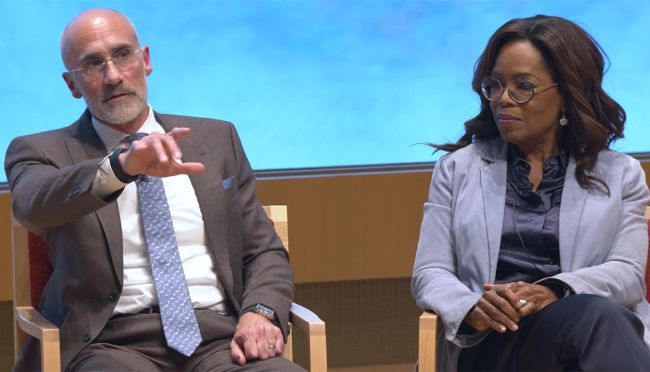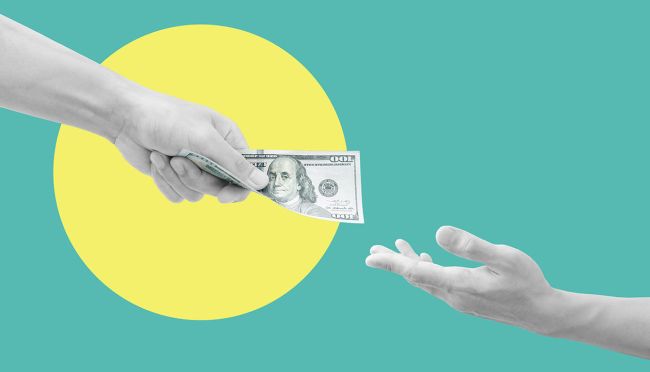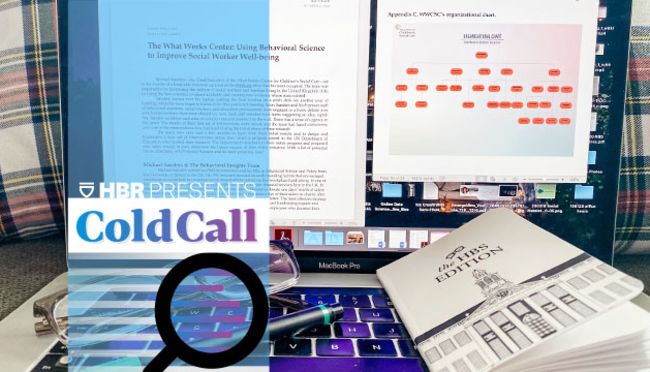Happiness →
→

- 02 Apr 2024
- What Do You Think?
What's Enough to Make Us Happy?
Experts say happiness is often derived by a combination of good health, financial wellbeing, and solid relationships with family and friends. But are we forgetting to take stock of whether we have enough of these things? asks James Heskett. Open for comment; 0 Comments.

- 04 Mar 2024
- What Do You Think?
Do People Want to Work Anymore?
Surveys indicate that US employee engagement and job satisfaction are down. To what degree are attitudes toward work to blame? asks James Heskett. Open for comment; 0 Comments.

- 14 Nov 2023
- What Do You Think?
Do We Underestimate the Importance of Generosity in Leadership?
Management experts applaud leaders who are, among other things, determined, humble, and frugal, but rarely consider whether they are generous. However, executives who share their time, talent, and ideas often give rise to legendary organizations. Does generosity merit further consideration? asks James Heskett. Open for comment; 0 Comments.

- 03 Oct 2023
- Research Event
Build the Life You Want: Arthur Brooks and Oprah Winfrey Share Happiness Tips
"Happiness is not a destination. It's a direction." In this video, Arthur C. Brooks and Oprah Winfrey reflect on mistakes, emotions, and contentment, sharing lessons from their new book.

- 12 Sep 2023
- Book
Successful, But Still Feel Empty? A Happiness Scholar and Oprah Have Advice for You
So many executives spend decades reaching the pinnacles of their careers only to find themselves unfulfilled at the top. In the book Build the Life You Want, Arthur Brooks and Oprah Winfrey offer high achievers a guide to becoming better leaders—of their lives.

- 28 Aug 2023
- Research & Ideas
The Clock Is Ticking: 3 Ways to Manage Your Time Better
Life is short. Are you using your time wisely? Leslie Perlow, Arthur Brooks, and DJ DiDonna offer time management advice to help you work smarter and live happier.

- 21 Aug 2023
- Book
You’re More Than Your Job: 3 Tips for a Healthier Work-Life Balance
Younger workers are rejecting the idea of sticking with one employer for the long haul and are instead finding happiness by job-hopping and creating dramatically different boundaries with work. In a new book, Christina M. Wallace maps out a step-by-step guide to building a flexible and fulfilling life that includes rest, relationships, and a rewarding career.

- 15 Aug 2023
- Research & Ideas
Why Giving to Others Makes Us Happy
Giving to others is also good for the giver. A research paper by Ashley Whillans and colleagues identifies three circumstances in which spending money on other people can boost happiness.

- 14 Feb 2023
- Research & Ideas
When a Vacation Isn’t Enough, a Sabbatical Can Recharge Your Life—and Your Career
Burning out and ready to quit? Consider an extended break instead. Drawing from research inspired by his own 900-mile journey, DJ DiDonna offers practical advice to help people chart a new path through a sabbatical.

- 10 Jan 2023
- Research & Ideas
How to Live Happier in 2023: Diversify Your Social Circle
People need all kinds of relationships to thrive: partners, acquaintances, colleagues, and family. Research by Michael Norton and Alison Wood Brooks offers new reasons to pick up the phone and reconnect with that old friend from home.

- 29 Sep 2022
- Op-Ed
Inclusive Leadership Advice: Get Comfortable With the Uncomfortable
People tend to seek sameness, but they can teach themselves to relish in the differences of the human experience. Francesca Gino offers these three principles from improv to anyone who's trying to lead more inclusively.

- 21 Sep 2022
- Research & Ideas
You Don’t Have to Quit Your Job to Find More Meaning in Life
Before you give notice and go on a vision quest, consider this: Fulfillment doesn't require big change, says research by Julian De Freitas and colleagues. In fact, you can find more meaning even in a job you don't love.

- 02 Jun 2022
- Research & Ideas
Blissful Thinking: When It Comes to Finding Happiness, 'Your Dreams Are Liars'
Happiness research is all the rage. Arthur Brooks shares how understanding the origins of joy can improve the way we lead organizations—and our personal lives.

- 25 Jan 2022
- Research & Ideas
More Proof That Money Can Buy Happiness (or a Life with Less Stress)
It's not about the bigger home or the better vacation. Financial stability helps people escape the everyday hassles of life, says research by Jon Jachimowicz. Closed for comment; 0 Comments.

- 29 Nov 2021
- Research & Ideas
How Bonuses Get Employees to Choose Work Over Family
Working late again? Research by Ashley Whillans and colleagues shows how incentive pay encourages workers to think of downtime as wasted time. Open for comment; 0 Comments.

- 05 Jan 2021
- Cold Call Podcast
Using Behavioral Science to Improve Well-Being for Social Workers
For child and family social workers, coping with the hardships of children and parents is part of the job. But that can cause a lot of stress. Is it possible for financially constrained organizations to improve social workers’ well-being using non-cash rewards, recognition, and other strategies from behavioral science? Assistant Professor Ashley Whillans describes the experience of Chief Executive Michael Sanders’ at the UK’s What Works Centre for Children’s Social Care, as he led a research program aimed at improving the morale of social workers in her case, “The What Works Centre: Using Behavioral Science to Improve Social Worker Well-being.” Open for comment; 0 Comments.

- 05 Oct 2020
- Book
Want to Be Happier? Make More Free Time
Enjoying life requires time, but too often we willingly give it away in pursuit of money and career. Ashley Whillans shows how to restore the proper balance. Open for comment; 0 Comments.

- 21 May 2020
- Research & Ideas
Fighting the COVID Blues: Advice from Business Research
Pandemic uncertainty doesn't have to spell doom. Happiness experts at Harvard Business School offer these research-based strategies for managing stress. Open for comment; 0 Comments.

- 26 Nov 2018
- Book
Make Your Employees Feel Psychologically Safe
To do their best work, people need to feel secure and safe in their workplace. In a new book, Amy C. Edmondson details how companies can develop psychological safety. Open for comment; 0 Comments.

Why Work Rituals Bring Teams Together and Create More Meaning
From weekly lunch dates with colleagues to bedtime stories with children, we often rely on rituals to relax and bond with others. While it may feel awkward to introduce teambuilding rituals in the workplace, the truth is, the practices improve performance, says Michael Norton in his book The Ritual Effect.